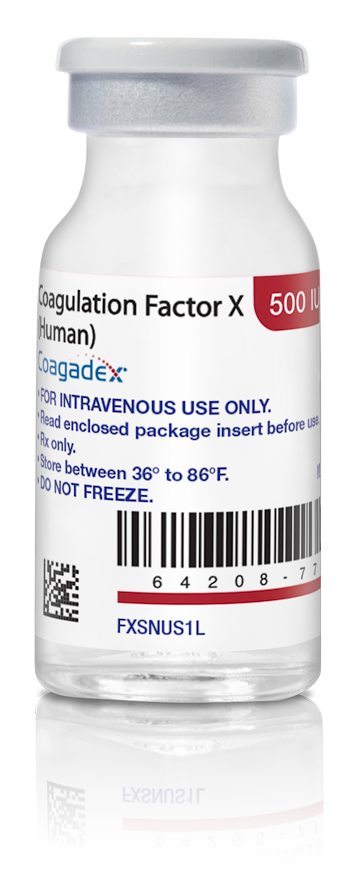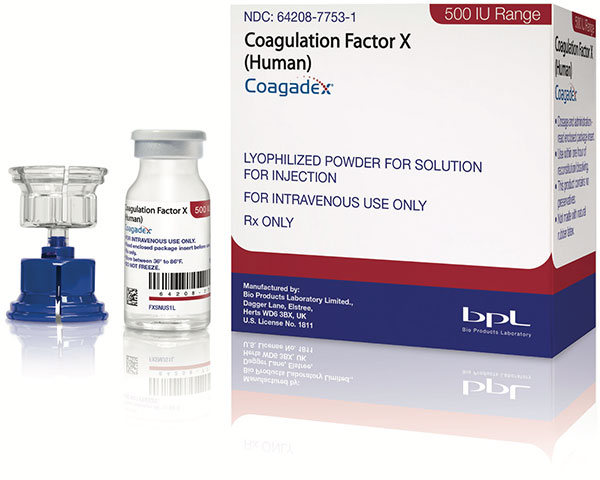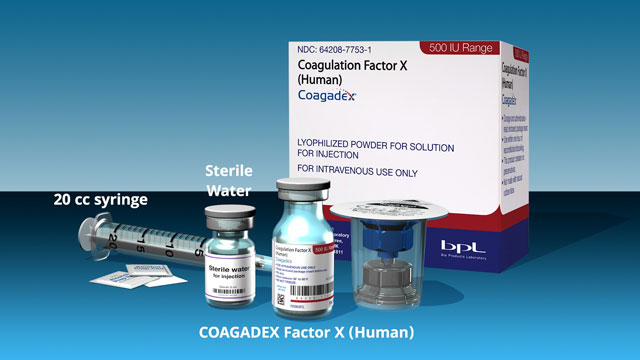Introducing COAGADEX
COAGADEX is the first and only treatment indicated to replace exactly what these patients are missing – Factor X1
Factor content of COAGADEX2


Factor X content in PCCs is variable and imprecise2-4
PCCs contain variable amounts of factor X, requiring higher volumes to reach optimal factor X levels
Composition of selected factor X-containing products*
| Vitamin K-dependent clotting factor content IU/mL after reconstitution | |||||
|---|---|---|---|---|---|
| Product Name | Manufacturing Reference Assay | Factor X | Factor IX | Factor VII | Factor II |
| COAGADEX†2 | Factor X | 100 | ≤ 1 | ≤ 1 | ≤ 1 |
| BALFAXAR® (Prothrombin Complex)3 | Factor IX | 15–27 | 20–32 | 12–20 | 17–25 |
| KCENTRA® (Prothrombin Complex)4 | Factor IX | 25–51 | 20–31 | 12–20 | 19–40 |
- *No head-to-head clinical studies have been conducted to compare the clinical effectiveness of these three products.
- †IU of factors II, VII, and IX per 100 IU of factor X.
For patients with HFXD, administration of high concentrations of unneeded factors II, VII, and IX may be associated with a risk of thromboembolic complications. Concentrations of factors II, VII, and X may not always be known, vary among PCCs, and can vary among batches of the same PCC.5,6
Other risk factors that can contribute to thrombotic risk include:
- Older age
- Traumatic injury
- Surgical intervention
- Pregnancy intervention
- Oral contraceptives
- Being overweight or obese
HFXD, hereditary factor X deficiency; PCC, prothrombin complex concentrate.
COAGADEX Pharmacokinetics
Twice-weekly dosing of COAGADEX is recommended for prophylactic use1

For children <12 years of age, incremental recovery is reduced compared to adults
- Incremental recovery was lowest in children <6 years of age1
Measurements Recorded at Visit 1 After First Dose of COAGADEX

COAGADEX Dosing Instructions1
- Dose and duration of treatment with COAGADEX depend on the:Severity of the factor X deficiencyLocation and extent of bleedingPatient’s clinical condition
- Base each patient’s dose and frequency on individual clinical response. Do not administer more than 60 IU/kg daily
 Recommended Initial Dosing for Prophylaxis of Bleeding Episodes
Recommended Initial Dosing for Prophylaxis of Bleeding Episodes
| Age | Initial Dose | Further Management |
|---|---|---|
| 0 to <12 years | 40 IU/kg twice weekly | Monitor trough blood levels of factor X targeting at least 5 IU/dL and adjust dosage to clinical response and trough levels. Do not exceed a peak level of 120 IU/dL |
| ≥12 years | 25 IU/kg twice weekly |
 Recommended Initial Dosing for On-demand Treatment of Bleeding Episodes
Recommended Initial Dosing for On-demand Treatment of Bleeding Episodes
| Age | Initial Dose | Further Management |
|---|---|---|
| 0 to <12 years | 30 IU/kg | Infuse at first sign of bleeding. Repeat at intervals of 24 hours until the bleed stops |
| ≥12 years | 25 IU/kg |
 Recommended Initial Dosing for Perioperative Management
Recommended Initial Dosing for Perioperative Management
| Age | Initial Dose | Further Management |
|---|---|---|
| 0 to <12 years | Use a factor of 0.6 to calculate the required dose | Pre-surgery: raise plasma factor X levels to 70-90 IU/dL Post-surgery: maintain plasma factor X levels at ≥50 IU/dL until the patient is no longer at risk of bleeding due to surgery |
| Dose (IU) = body weight (kg) x desired factor X rise* (IU/dL or % of normal) x 0.6 | ||
| ≥12 years | Use a factor of 0.5 to calculate the required dose | Pre-surgery: raise plasma factor X levels to 70-90 IU/dL Post-surgery: maintain plasma factor X levels at ≥50 IU/dL until the patient is no longer at risk of bleeding due to surgery |
| Dose (IU) = body weight (kg) x desired factor X rise* (IU/dL or % of normal) x 0.5 | ||
*The desired factor X rise is the difference between the patient’s plasma factor X level and the maximum desired level.
Storage and Supply Information
- Store COAGADEX in a refrigerator or at room temperature at 36° to 86º Fahrenheit (2° to 30° Celsius)
- Do not freeze
- Single-use vial sizes
- 250 IU with 2.5 mL sterile water (NDC 64208-7752-1)
- 500 IU with 5.0 mL sterile water (NDC 64208-7753-1)
- Mix2Vial® in each box for reconstitution*

*Mix2Vial is a registered trademark of West Pharmaceutical Services.
COAGADEX Reconstitution Instructions
References: 1. COAGADEX® (Coagulation Factor X, Human) Prescribing Information. Durham, NC: BPL Limited. 2023. 2. Data on file, BPL-RD050-0515. 3. BALFAXAR® (prothrombin complex concentrate, human-lans) Prescribing Information. Paramus, NJ: Octapharma USA Inc. 2023. 4. KCENTRA® (Prothrombin Complex Concentrate (Human)) Prescribing Information. Kankakee, IL: CSL Behring LLC. 2023. 5. Sorenson B, Spahn DR, Innerhofer P, et al. Crit Care. 2011;15:201. 6. Menegatti M, Peyvandi F. Semin Thromb Hemost. 2009;35:407-415. 7. Austin S, et al. Haemophilia. 2016;22:426-432.


Indications and Usage for COAGADEX
COAGADEX, a plasma-derived blood coagulation factor X concentrate, is indicated in adults and children with hereditary factor X deficiency for:
- Routine prophylaxis to reduce the frequency of bleeding episodes
- On-demand treatment and control of bleeding episodes
- Perioperative management of bleeding in patients with mild, moderate and severe hereditary factor X deficiency
Contraindication for COAGADEX
COAGADEX is contraindicated in patients who have had life-threatening hypersensitivity reactions to COAGADEX.
Important Safety Information for COAGADEX
Allergic type hypersensitivity reactions, including anaphylaxis, are possible with COAGADEX. If symptoms occur, patients should discontinue use of the product immediately, contact their physician, and administer appropriate treatment.
The formation of neutralizing antibodies (inhibitors) to factor X is a possible complication in the management of individuals with factor X deficiency. Carefully monitor patients taking COAGADEX for the development of inhibitors by appropriate clinical observations and laboratory tests.
COAGADEX is made from human plasma and may contain infectious agents, e.g. viruses, the variant Creutzfeldt-Jakob disease (vCJD) agent and, theoretically, the Creutzfeldt-Jakob disease (CJD) agent. No cases of transmission of viral diseases, vCJD or CJD, have been associated with the use of COAGADEX.
In clinical studies, the most common adverse reactions (frequency ≥5% of subjects) with COAGADEX were infusion site erythema, infusion site pain, fatigue and back pain.
Please see complete Prescribing Information for COAGADEX.
You are encouraged to report negative side effects of prescription drugs to the FDA. Visit https://www.fda.gov/medwatch, or call 1-800-FDA-1088.
You may also call Kedrion at 1-866-398-0825 or email US_Medicalinfo@kedrion.com.
